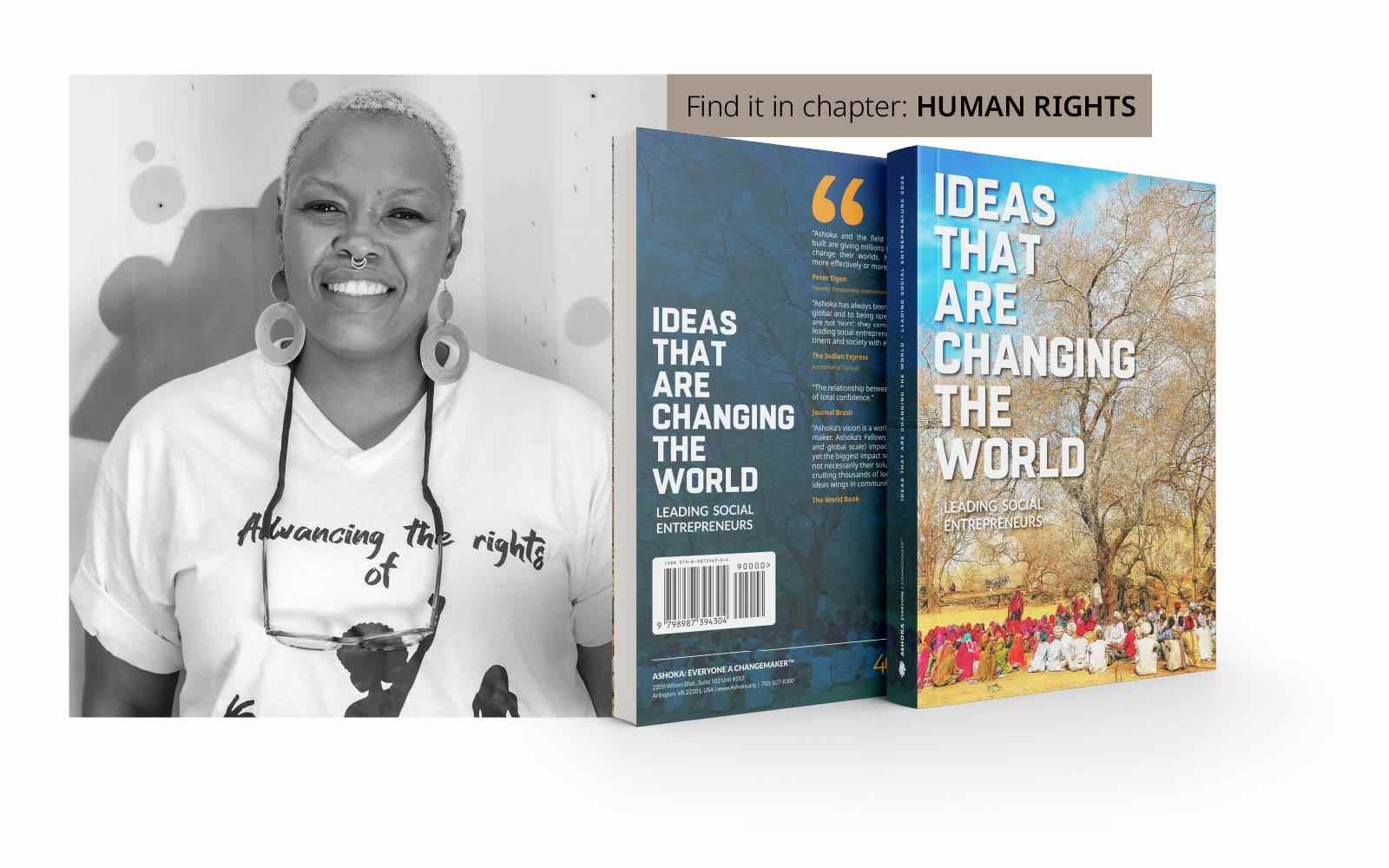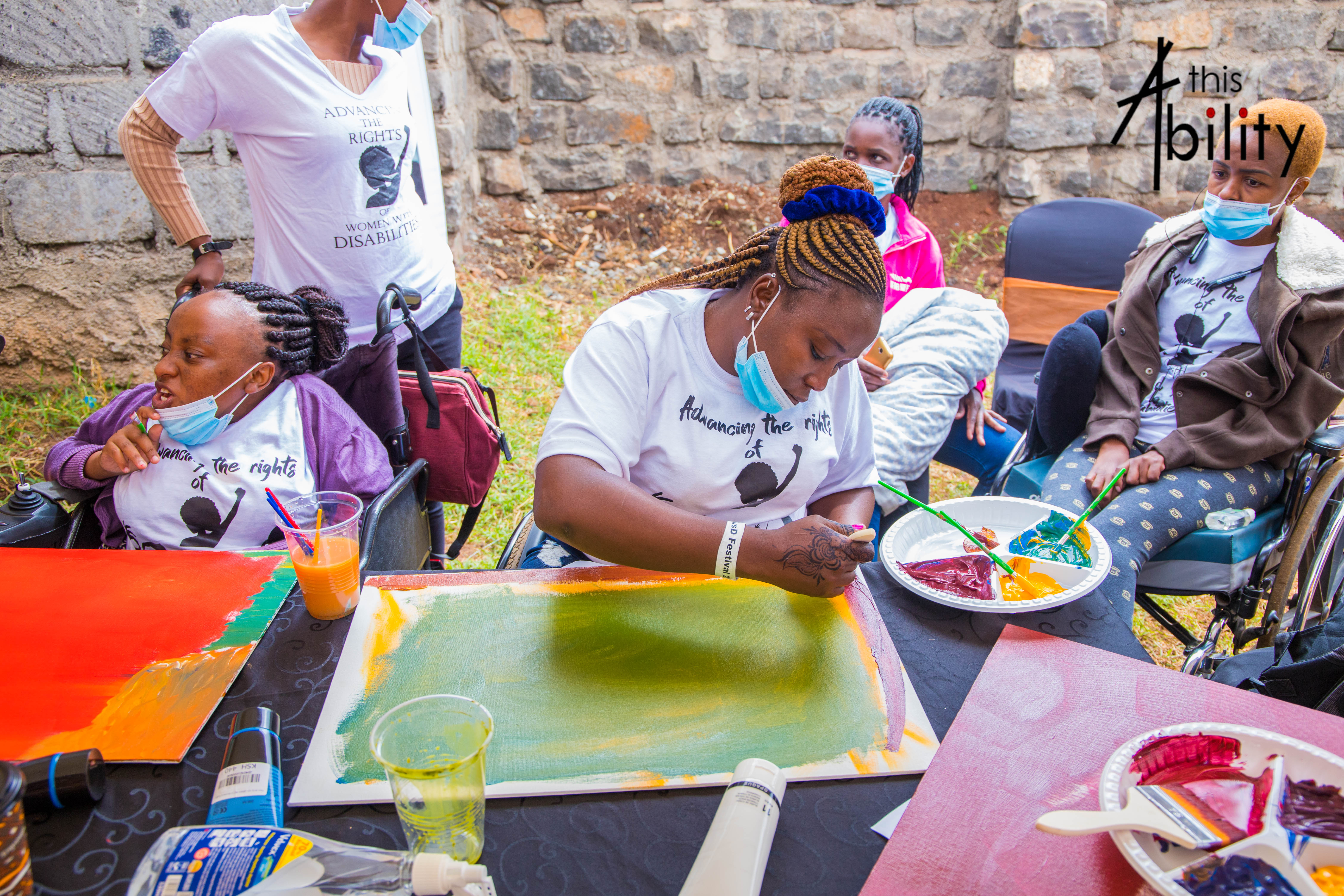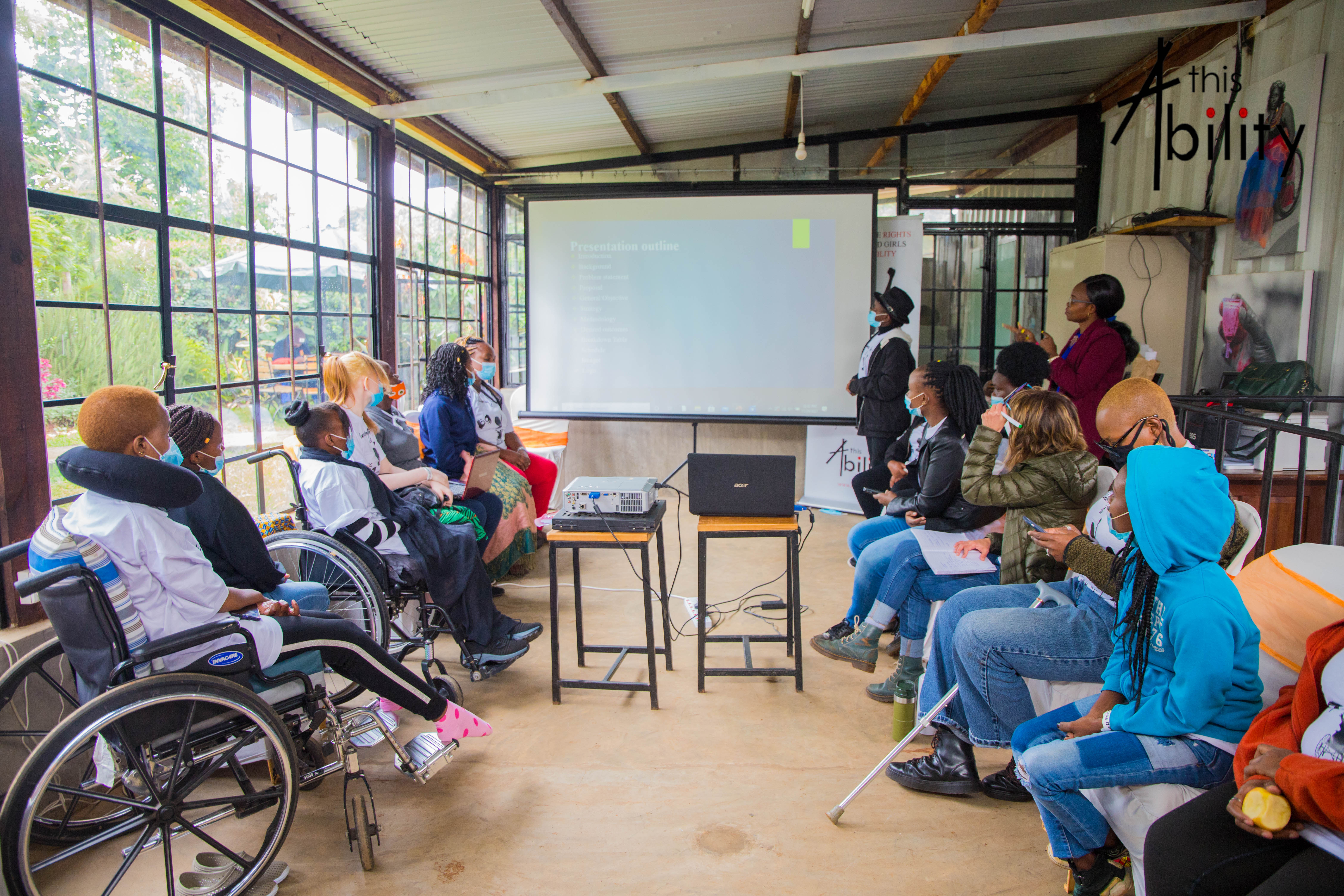Lizzie Kiama
Founder, This Ability
Fellow project website: www.this-ability.org
Through targeted communications, advocacy and county-by-county movement building of women and girls with disabilities across Kenya, Lizzie is constructing a new public narrative about their full potential, rooted in control over their own sexual and reproductive health, workforce access, and independence in choosing how and with whom they choose to live.

THE NEW IDEA
Lizzie understands the creative, problem-solving, innovative spirit commonly found in those who are disabled. When the world is designed for those that are able-bodied, those with disabilities are forced to create new ways, find alternative possibilities, and demand access to opportunities. These are strengths that add value and perspective to any organization or business. Lizzie’s women-led organization, This-Ability, pursues a bold strategy utilizing business principles of marketing and advertising to transform the public’s perception of what it looks like for Kenyan women and girls with disabilities to live their lives to the fullest while contributing their strengths to the communities around them while leveraging technology. The strategy includes amplifying the experiences of women with disabilities through Mama Siri, a tollfree service that provides information and support to this target group, building skills through Skills eLearning platform that develops advocacy capacity of women with disabilities and other stakeholders in the community, and creating visibility of disabled women through data collection using their Hesabika, USSD platform. This Ability invests heavily in social media and narrative change using components such as the podcast series, PAZA! Conversations, which seek to document and create visibility for the experiences of women and girls with disabilities. They also have a YouTube program called Let's Talk to encourage this group to share their experiences accessing quality sexual and reproductive health care as well as family planning services.
Beginning in eight counties from Mombasa to Kakamega, the organization hosts advocacy forums featuring, so far, the challenges faced by 400 disabled women. The convening includes meetings with local advocacy and human rights partners (including County Government representatives and community-based organizations) to foster connection, collaboration, and empathy. This platform has provided the first opportunity in Kenya for press conferences to be held where women with disabilities share their sexual reproductive health issues. As a result, concrete action plans with real and measurable impact were co-created by the relevant stakeholders while holding duty bearers accountable.
This-Ability has used these forums to leverage technology across its three main programs. Hesabika (Swahili word to “be counted”) is the first national Unstructured Supplementary Service Data (USSD) platform on women and young girls with disabilities. The database contains more than 20,700+ profiles and this aggregated information is provided to potential employers, to product and service providers, as well as to international, national, and local organizations focused on providing programmatic as well as solidarity and networking opportunities for people with disabilities. Once new members register, This Ability provides access and information while gathering their data to help inform policy interventions with, for example, the Ministry of Health.

“Often, Lizzie sees how people overlook disability, which is why her mission is to advance the rights and inclusion of women with disabilities and to make them visible.” - D.N.A. Disability News Africa
The use of technology to provide services and information coming to fruition has triggered interest from other Kenya-based NGOs in contributing to, or replicating, this approach. And the fact of these ongoing conversations has drawn the interest of other organizations, international as well as Africa-based, in the usefulness of this information in serving the needs of disabled African women and girls.
THE PROBLEM
Kenyan society maintains an outdated set of attitudes in its health care system related to the false assumption of someone with a disability as somehow “ill” and, as such, needing to stay home until they are “cured,” which effectively means never. This biased mischaracterization is paired with a “common charity” social approach that views such people as helpless and unable or unwilling to represent themselves.
For example, in 2017, the Kenyan Government created a report on women and girls which did not include any information on women and girls with disabilities. This prompted Lizzie to spearhead the creation of a shadow report which was submitted to the United Nations Convention on the Elimination of Discrimination Against Women (CEDAW). As a result, Kenya is now measured by UN agencies for their ability to provide inclusion for women and girls with disabilities.

At the policy level, a weak law enforcement system limits opportunities to improve the conditions for women and girls with disabilities. For example, the 2003 “Persons with Disabilities Act” sets forth a comprehensive law to cover rights, rehabilitation, and equal opportunities for persons with disabilities and requires both private and public sector employers to reserve 5% of all jobs for disabled persons. In practice, the government does not regularly collect such information from private employers, and when it sometimes does for public employers, it does not make this information readily available. Enforcement actions taken against public and private employers pursuant to this law are rare.
THE STRATEGY
Lizzie is working with women with disabilities county by county on the importance of storytelling and data collection techniques. She does this through creative integration to provide holistic interventions that allow women with disabilities to feel confident about engaging in difficult conversations. This work will contribute to an upcoming report, “National Agenda Anti-Corruption on Women and Girls with Disabilities,” to coincide with the 2022 national elections. Lizzie is using the creation of these stories by local women to organize and build the confidence of county-level teams of women to step forward and become leaders in their communities.
Lizzie organized the pre-ICPD25 (25th International Conference for Population and Development) meeting with the United Nations that brought together women with disabilities to discuss issues relevant to sexual and reproductive health. The conference, hosted in Kenya in 2019, brought together more than 8,000 delegates representing governments and advocates, health organizations, women, and youth activists from 170 countries.

Subsequently, the United Nations Population Fund (UNFPA) appointed This Ability as the implementing partner for disability programs in Kenya. In addition, Lizzie has co-authored opinion editorials with UNFPA Head of Office on issues related to disabilities before and during COVID-19 as well as being featured in reports and social media posts on several UN Agency channels.
In 2019 This Ability launched ‘Introduction to Digital Literacy,’ a face-to-face course aimed at building digital skills among young women with disabilities focusing on their interactions with the internet and social media. Given COVID-19 limitations, in 2020 Lizzie and team created Skills, an e-Learning platform, and launched a program to equip more women with various disabilities on digital marketing skills and storytelling. The success of the e-learning platform motivated the team to explore more opportunities. For this reason, they launched the first online program in Kenya to equip 100 healthcare providers with the necessary knowledge, both anthropological and medical, on healthcare needs for women and girls with disabilities in partnership with the UNFPA. The goal is to create a blueprint amongst healthcare providers across the country for treating women and girls with disabilities.
In 2020 This Ability launched Mama Siri (Swahili for a woman who keeps a secret) is a toll-free service managed by women with disabilities in 8 counties. They coordinate and provide referral services on gender-based violence and sexual reproductive health rights. Mama Siri is at the heart of all their work in the community because it provides peer mental health support to those calling the service – so far over 10, 000 calls have been received. The evidence generated from the calls and the follow-on referrals will allow This Ability to make concrete policy recommendations to the Ministry of Health as well as other stakeholders.
To date, This Ability’s collective efforts have led to tangible changes for people with disabilities with a special focus on girls’ and women’s reproductive rights and healthcare. For example, organized forums and distributed updates now include new information on technology and market development tools as well as social media how-tos. This builds on women’s self-esteem and leadership efforts to hold policymakers and organizations accountable while making injustices visible.
THE PERSON
Lizzie is the firstborn of a middle-class family from the coastal city of Mombasa, Kenya. In her teenage years, she excelled in arts, drama, poetry, acting, and other creative activities. Lizzie was also very passionate about sports and participated in table tennis, distance running, and basketball.
At the age of 18, Lizzie was involved in a car accident. When she regained consciousness, one of her legs had been amputated. During her ensuing convalescence, her mother played a critical role in helping Lizzie to resume her social life, including dating, and not view her difference in a way that would prevent her from ever finding love and family.
The delivery of her first child led Lizzie to more deeply confront the reality that she could not walk without the support of prosthetics. This was when Lizzie decided to fully embrace her identity as a woman with a disability. An internship at a government agency, the National Council for Persons with Disabilities, led to her being a Job Placement Assistant helping people with disabilities find employment. While she acquired insights into the challenges facing disabled people, Lizzie became frustrated by the “bureaucracy” that prevented her desire to innovate around obstacles. “Bringing new ideas was always met with hesitation,” she explained. Due to this and her desire to learn more, Lizzie left her job and started This Ability.
